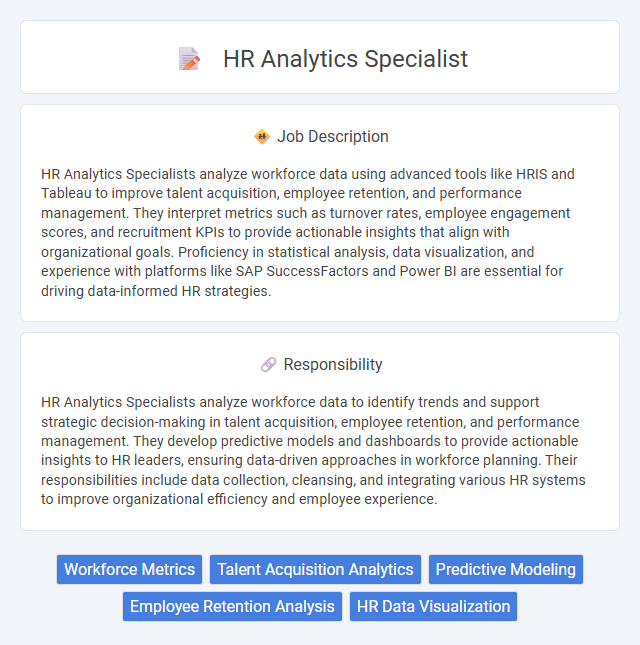
HR Analytics Specialists analyze workforce data using advanced tools like HRIS and Tableau to improve talent acquisition, employee retention, and performance management. They interpret metrics such as turnover rates, employee engagement scores, and recruitment KPIs to provide actionable insights that align with organizational goals. Proficiency in statistical analysis, data visualization, and experience with platforms like SAP SuccessFactors and Power BI are essential for driving data-informed HR strategies.
Candidates with strong analytical skills and a passion for data-driven decision-making are likely to thrive as HR Analytics Specialists. Individuals comfortable working with complex datasets and possessing a keen eye for identifying workforce trends may find this role particularly suitable. Those who prefer interpersonal tasks over quantitative analysis might face challenges adapting to the demands of this job.
Qualification
An HR Analytics Specialist must possess strong analytical skills, proficiency in data analysis tools such as SQL, Python, and Excel, and experience with HR information systems like SAP SuccessFactors or Workday. A background in human resources, statistics, or data science, often supported by a bachelor's or master's degree, is essential for interpreting workforce data to improve talent acquisition, employee retention, and overall organizational performance. Expertise in predictive modeling and data visualization platforms like Tableau or Power BI enhances the ability to deliver actionable insights that drive strategic HR decisions.
Responsibility
HR Analytics Specialists analyze workforce data to identify trends and support strategic decision-making in talent acquisition, employee retention, and performance management. They develop predictive models and dashboards to provide actionable insights to HR leaders, ensuring data-driven approaches in workforce planning. Their responsibilities include data collection, cleansing, and integrating various HR systems to improve organizational efficiency and employee experience.
Benefit
HR Analytics Specialists are likely to provide organizations with valuable insights into employee performance, engagement, and retention by leveraging data-driven strategies. Their expertise can enhance decision-making processes, potentially leading to improved workforce productivity and reduced turnover rates. Companies may experience cost savings and a stronger competitive advantage through more effective talent management facilitated by HR analytics.
Challenge
HR Analytics Specialists likely face the challenge of integrating complex data from diverse sources to generate actionable insights. The role probably demands strong skills in statistical analysis and data visualization tools to address workforce trends effectively. Navigating data privacy concerns and ensuring compliance might also present ongoing obstacles in this position.
Career Advancement
HR Analytics Specialists leverage data-driven insights to optimize workforce performance, playing a critical role in strategic decision-making. Mastery of advanced analytics tools and human capital metrics enhances opportunities for promotion to senior HR roles or business intelligence leadership. Continuous skill development in machine learning and predictive analytics propels career growth within HR technology and organizational development sectors.
Key Terms
Workforce Metrics
An HR Analytics Specialist leverages workforce metrics to drive strategic decision-making and optimize talent management processes. By analyzing key performance indicators such as employee turnover rates, absenteeism, and productivity levels, they identify trends and provide actionable insights to enhance organizational efficiency. Proficiency in data visualization tools and statistical analysis techniques is essential for transforming complex datasets into clear, impactful reports that support HR initiatives.
Talent Acquisition Analytics
HR Analytics Specialists specializing in Talent Acquisition Analytics leverage data-driven insights to optimize recruitment strategies, improve candidate sourcing, and reduce time-to-hire. They analyze key metrics such as applicant tracking, candidate engagement, and hiring funnel effectiveness to enhance workforce planning and diversity initiatives. Proficiency in tools like ATS platforms, data visualization software, and predictive analytics models is essential for transforming recruitment data into actionable business intelligence.
Predictive Modeling
HR Analytics Specialists leverage predictive modeling techniques to analyze employee data and forecast future workforce trends such as turnover, performance, and hiring needs. By utilizing machine learning algorithms and statistical methods, they create models that help organizations make data-driven decisions to optimize talent management and improve employee engagement. Expertise in tools like Python, R, and advanced HRIS systems enables these specialists to transform complex datasets into actionable insights for strategic planning.
Employee Retention Analysis
HR Analytics Specialists specializing in Employee Retention Analysis leverage data-driven insights to identify key factors influencing workforce stability and turnover rates. They utilize predictive modeling and statistical techniques to interpret employee engagement, satisfaction metrics, and exit interview data, enabling targeted retention strategies. Expertise in HR information systems and advanced analytical tools like Python, R, or Tableau enhances the ability to optimize retention initiatives and reduce attrition costs.
HR Data Visualization
HR Analytics Specialists specializing in HR Data Visualization transform complex workforce data into intuitive visual reports and dashboards that drive strategic decision-making. Expertise in tools like Tableau, Power BI, or Python visualization libraries ensures clear representation of key metrics such as employee turnover, engagement, and productivity trends. Leveraging data visualization enhances HR teams' ability to identify patterns, forecast workforce needs, and improve talent management outcomes effectively.
 kuljobs.com
kuljobs.com